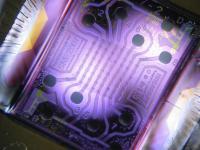A research team at Stanford University has created a biosensor microchip. The device could accelerate drug development processes. The microchips, packed tightly with sensitive nanosensors, will study the manner, in which proteins attach themselves to each other, to help understand the potential benefits and side effects of medication.
 Stanford's Microchip with 64 Nano-sensors
Stanford's Microchip with 64 Nano-sensors
A 1cm nanosensors array can constantly and at the same time supervise great multitudes of proteins binding together. The sensor will also be able to identify communication sensitively and proffer results rapidly. Multiple proteins can be packed into a single chip and conduct the trials uninterruptedly, according to Shan Wang, who led the team. Wang is a professor of materials science and engineering, and electrical engineering.
Richard Gaster, a postdoctoral student in bioengineering and medicine, is the lead author of the research paper that appeared online recently in Nature Nanotechnology, and says the test could help discover how conducive a drug was to every protein found in the human body. The magnetic nanotags bound to the protein that is being analyzed, such as a drug, could render the controlling process more sensitive.
The team has developed a system to analyze the proteins that will enable them to precisely foretell the result of communication after analyzing and monitoring the data for just a few moments. The nanotags are designed to bind them to the target protein. When the tagged protein binds itself to a protein connected to a nanosensor, the nanotag alters the magnetic field surrounding the nanosensor. Breast cancer proteins were placed on the nanosensor array, with other organ proteins and tissue. The communication was added with its nanotags, allowing the team to determine, which proteins were used by the drug to bind toand the intensity and time of the binding.